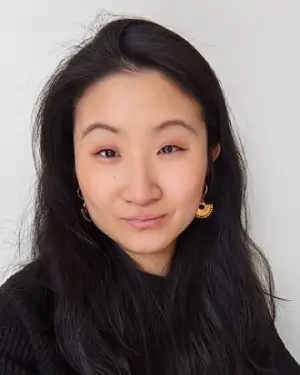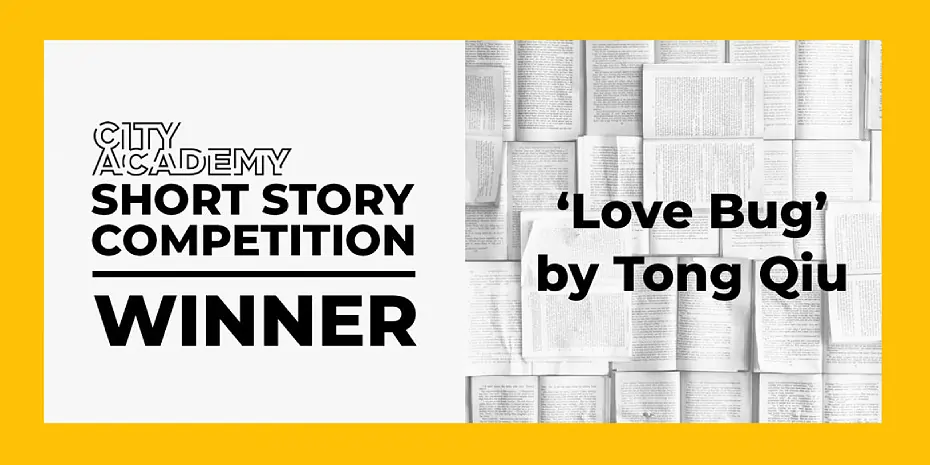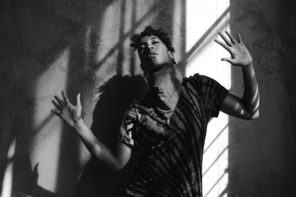Following our inaugural City Academy Short Writing Competition, We are delighted to introduce Tong Qiu, the winner, with her entry 'Love Bug'.
Love Bug
As a little girl, when I sneezed - which was all the time because I was allergic to the black mold that flowered from every corner of our leaky basement flat - my grandmother would pass me her handkerchief and ask “who’s missing you today?” In China, where we were both from but only she remembered, a sneeze was a sign that someone was thinking of you.
I would swat away the handkerchief, which had once been white but was now the rotten yellow colour of her teeth, though her hand embroidered chrysanthemums still held their stitches brightly. I opted instead for a Kleenex from my own pocket; nobody at school would be seen dead using a crusty cotton handkerchief.
I’d roll my eyes, or sigh with exasperation, or both, and tell her that she was using the wrong expression. “You’re supposed to say bless you,” I scolded in English, explaining it like she was the child and I was the grown up.
But, as it turns out, she was right.
***
I’d like to say that I can recall exactly what I was doing when it first started. But I can’t. I had swiped a crate of Absolut left by a careless delivery driver on the porch of the student house on Grove Road. One of those kids had once kicked me while I was sleeping in the doorway of the launderette on the high street. His friend tried to apologize by giving me his half eaten Big Mac. I couldn’t decide which one of them I hated more.
I’d been stealing their packages for months, but twelve bottles of vodka was the best haul yet. Like an alcoholic hamster, I took it to my secret hiding place; an abandoned garage under the railway arches, and drank my way steadily through the stash.
By the time I sobered up again, Britney was dead.
I thought I was tripping at first, from alcohol poisoning or just good old mental illness, but it quickly became apparent that nobody else understood what was happening either. Within a week the world’s A list was gone. Hollywood darlings, triple platinum Grammy winners, that Greta girl who was trying to save the planet. All dropped like flies, and people lost their minds. How could all those famous people be so goddamn mortal? Didn’t millions of thumbs ups and retweets protect you from silly things like death?
But it wasn’t just celebrities. Fast on their heels were children everywhere, from Swiss boarding schools to Rio’s favelas. Lovers too, particularly new ones in the haze of infatuation and old ones in the bitter fog of betrayal. From coast to coast, every community’s unsung heroes got their songs too late, in tearful requiems. From beloved nurses whose smiles were more soothing than a spoonful of sugar to teachers who never gave up on even their most delinquent of students. All dropped like flies. Succumbed to bouts of coughing and sneezing that morphed into a fever which climbed and climbed until it burned out their organs one by one. Killing most within 24 hours.
By the time my head stopped spinning, the streets were quiet, the shops had been looted, and the few newspapers that were still being printed had given up on reporting and were instead panic boards full of questions. What kind of disease doesn’t discriminate by demographic and manifests spontaneously all around the world, with no discernable infection paths? How the hell do people protect themselves from something like that? There were no answers. Only hysteria and endless deaths.
I didn’t know why I wasn’t dead yet, but figured it was just a matter of time. I wasn’t bothered. I’d been clinging to life half heartedly for nearly a decade, I didn’t begrudge it finally pulling away from my limp grip. My liver felt vaguely surprised that we had made it this far at all.
But if I was going to go, I wanted to wash my hair first.
***
I let myself into the cafe next to the launderette. It was (or had been) a cosy family run affair that specialised in fruit smoothies and Mediterranean breakfasts. The family was now a huddle of corpses in the bedroom upstairs. It looked like they had died clinging to each other. As I closed the door to their room, and was stuffing sheets into the gap between the door and the floor to trap the smell of death and decomp inside, I couldn’t help but be a little bit jealous. Nobody would hold me like that when it was my turn.
I helped myself to their shower, shampooed my hair for the first time in nearly a year, and put on a green daisy-speckled dress that I found in the other bedroom. I guessed it had belonged to the younger daughter. The older one had too much of a goth vibe for it. I stood in the mirror and liked how the vibrant emerald colour drowned me out. My knotted scowl, my hollow, ethanol washed stare, my sallow skin and its constellations of scabs and scars, all disappeared into the hopefulness of that dress. My reflection stared back at me a stranger, and I liked that about it. Myself was the last person I wanted to see.
I went downstairs, back into the cafe, and followed the recipes, handwritten in neat blue biro on note cards with frayed corners, taped up behind the counter. I made myself smoothies and halloumi and spinach omelettes, and waited to die.
***
But days went by, and I kept waking up to them. The fruits ripened and rotted, as I imagined the corpses did too, though I never opened the door to that room again. Ten years living on the streets of London meant I could stomach a lot, but a pile of rotting corpses that I couldn’t help but envy was too much, even for me.
I got bored of omelettes. I washed my hair again and again until it was like a L’Oreal advert. Somehow the hot water pounding down on my head never felt as good as the first time, when I thought it would be the last.
I kept the news on all the time, even though the anchors and reporters were gone. The channels just broadcast internet feeds, pulling updates from news sites and Twitter, and even those dribbled in more and more infrequently as the human race hurtled towards extinction.
Then about a week into my cafe squat, someone on Twitter called TruthSlayer came up with a theory. A virus transmitted by human affection. They said that by loving, admiring, craving, worrying or thinking about someone, you were infecting them.
“Thinking of you” had somehow been promoted from a lazy Hallmark card to a fatal threat. When you shower someone with love, they said, you might as well be showering them with napalm.
Of course, it was just a theory, and a wild one at that. From someone called TruthSlayer for God’s sake. But there were hardly enough scientists left to disprove it. And no one could put forward a better one. In a strange way, it made sense; for the unthinkable to explain the inexplicable.
Really, it should be heartening that so many got wiped out so quickly. Love only had to take on the guise of a deadly virus to prove that it really did conquer all. The romantics were right. My grandmother was right.
And, of course, it explained why I was still alive.
***
I hadn’t spoken to anyone for weeks, even before the pandemic (if you can call it that. At what point does a pandemic become an apocalypse?) And the last person I had spoken to was the guy I blew in his Volvo in the McDonald’s car park, which doesn’t exactly qualify for a conversation. I asked for fifty quid. He insisted he only had forty, but said he could throw in a half pack of Bensons. I said OK and went to work on his semi erect dick, trying to ignore the odour of French fries and ball sweat. As I was bent over his lap, I saw, in the corner of my eye, a child’s car seat in the back.
I really hope that kid loved his dad to death.
The last person who knew my name (or at least, who I gave a name to) was the nice security guard at Tesco, who would let me sleep under the covered area where the trolleys were kept even though she was supposed to kick me out. Sometimes she would even lend me a sip of the silver flask she hid somewhere in the folds of her vast bosom. It was usually a watery, sickly sweet rum, but one time it was a rich smooth scotch and she said she was celebrating because her granddaughter got into her first choice university that day. She had five grandkids and a bosom load of kindness. She probably died within the first week.
The last person who knew my real name, my Chinese name, was my grandmother. She’s been gone for ten years. It was a name that she loved but I hated, so it died when she did, and I’ve been Homeless Helen ever since. Loveless Linda. Nobody Nora. Giving out fake names to saints and blow jobs to sinners, erecting barricades between myself and a past in which somebody loved me, and I hated her back.
***
The smell from the bodies in the upstairs of the cafe finally became unbearable about the same time the internet started flickering offline. I’d also been sober for too long, and had started dreaming again. Of her. Her withered hands, veins popping like liquorice under rice paper skin. How her eyes would retreat into the folds and lines of her face, etched deeply around them like loss around a memory, when she smiled her yellow smile.
I dreamed of her cracking sunflower seeds on the bus, being laughed at by the kids and tutted at by the adults. I was there, next to her, retreating into an oversized hood, staring out the window, embarrassed. Angry, not at the jeering kids or their judging mothers, but at her.
When I woke, the anger turned to guilt and bubbled up like bile in my throat. I was choking, gagging, from the smell upstairs or the unwanted memories, I wasn’t sure, but either way, I had to get out of there.
So I left the cafe and made my way to Curtis’s. He was a drug dealer with a heart of gold, who gave discounts to the homeless. Very popular, so probably dead. But I hoped that maybe his stash hadn’t been ransacked yet.
The streets were now completely deserted. A tentative spring warmth had finally arrived, and the air was crisp, free from traffic fumes and laced with birdsong. When I got down to the canal, its green mirrored surface was covered in a light dusting of blossom petals, blown over from a nearby park in bloom. It was goddamn picturesque, this world without humans.
I let myself onto Curtis’s houseboat when it became apparent that it was empty. The Ellie Mae, she was called, after his ex-wife who had tried to stab him. She blamed it on a bad trip, but he was too paranoid not to file for divorce after that. He had told me that of course he didn’t want his home, his sanctuary, named after that crazy bitch, but turns out it’s a real hassle to get names changed on the houseboats register, so she remained the Ellie Mae.
I wondered if, after all this time, she still loved him enough to kill him. Or if he was still alive somewhere, disappointed that she really had gotten over him enough to spare him to a long and lonely life. Perhaps he was drowning his sorrows in the good stuff, because all he had left on the boat was a freezer bag half full of weed and a few wraps of coke. I was hoping for something with more oblivion guaranteed, but chain smoking the weed produced a good enough approximation.
I puffed until the dark corners of my mind were safely fogged up again. Then I put on one of Curtis’s Billie Holiday records (he was a surprise jazz fan), sat on the roof and shared some of the stale Chocolate Shreddies that I found in the cupboard with the ducks and the swans.
***
I’m not sure how many days ago that was. Five or fifteen, it doesn’t feel like it matters now. But I’ve exhausted the drugs and the cereal, and the ducklings have either left home or been eaten by foxes. Seeing the mummy duck swim around forlornly by herself felt weirdly more depressing than the death of humanity.
So I’ve come up the canal to raid the faux French wine bars of Angel. I couldn’t tell you what a pinot noir is, but it is definitely easier drinking than Absolut.
I take a bottle for the road, scouting the leafy residential streets spindling off Upper Street, trying to find an open door or window, an invitation for a nap, when one house stops me in my tracks. A sense of dejavu slaps me in the face.
A smart townhouse with an indigo door. Not blue, not violet, but indigo. I know this because, once upon a time, a puffy cheeked blonde child had told me so.
I have been here before.
I go up the three wide concrete steps that lead to the door. It’s locked. I knock, just in case, but of course, no answer comes. I take a long final swig to empty the bottle, then lob it into the ground floor window. It shatters with a satisfying din. From behind a nearby bin, a cat yowls in protest. A flock of pigeons take flight from the neighbour’s roof, cooing surprise.
I kick in as many of the jagged pieces of glass as I can and try to climb inside carefully. The bottle of pinot coursing through my veins is not doing much for my balance, and I stumble and fall inside, nicking my shin. A sharp scratch, a crimson ooze. This too feels familiar.
The decor has changed since I was last here, some twenty years ago. In the hallways, where once there was a heavily textured leafy patterned wallpaper, there is now a cool coat of matt pebble-coloured paint. The kitchen has completely changed too. When I close my eyes it is all warm creams and walnut, a country cottage wannabe. When I open them, it’s navy and chrome and smart appliances. But the sink is in the same place as it was before, under the window, and I can see her there. Washing the pans and handing them to me to dry, telling me about the birds and the trees we could see through the window.
Nai Nai. My grandmother.
My mind tries to run and hide from her again, but it’s no use. Sluggish with wine, it’s no match for the past that pours from these walls, a fast and relentless current that cannot be outrun. It rushes through me and makes me look.
***
She was a cleaner here. My Nai Nai who knew everything. Not just about birds and trees, but maths and physics too. She had been a mechanical engineer in China, before she retired and moved to London to help my parents with childcare. Then one rain and hate filled night, they died. Crushed by an impatient van. They had moved halfway across the world to give me the dream of a Western education, and Nai Nai was going to keep that dream alive. It was the only thing of her son’s that she could save, so she poured the soul of a grieving mother into it. Even if it meant a seventy year old woman taking on the care of a seven year old girl in a society whose language and culture was alien to her, who didn’t want her.
So she cleaned rich people’s houses. And even though they were so rich, they knew they could get away with paying her a pittance, because what other choices did she have? And so they did. During the school holidays, she would take me to work with her, into houses like this and I couldn’t believe that this was a home. It seemed so different to the little box with walls made of mold that we knew, that surely both things couldn’t share the same word?
One day, I was playing on those big concrete steps outside when I fell and scraped my knee. That evening, Nai Nai took out her dented medicine tin. She had brought it from China and it was filled with bottles of strange herbal smells, labeled with characters I couldn’t understand. She took out one bottle, dipped a cotton bud inside and applied the liquid to my wound. To prevent infection, she explained. It was cold and stung, and was a deep staining purple.
When we went back to the house the next day, the kid who lived there, a plump, cherubic child who was about a year or two younger than me, asked me why I bled indigo. I didn’t understand. He pointed to the front door. “That’s indigo”, he said. “Your blood, it’s the same colour. Are you an alien? Is that why you have no eyelids and talk funny with your granny?”
I don’t remember what I said to him, but I do remember crying angry tears at home that night. It was bad enough being squinty eyed and snub nosed. Why did she have to make it worse with her purple ointment? Why couldn’t she learn to speak, and act, English?
That night, the more I thought about it, the more I realised that it was all her fault. Her stubborn foreignness was why we were poor and ridiculed. She didn’t care that kids at school laughed at the clothes she had patched with bright embroidery thread, or the garlicky packed lunches she made me. That they’d hear her yelling after me in Chinese from the school gates, and mimic it loudly and grotesquely in class. That the teachers tried to pretend they didn’t also find it funny.
I decided that she was punishing me. I didn’t know why, I didn’t care. I just decided that we were at war and I was going to fight back.
I refused to speak to her in Chinese. Made her drop me off around the corner, at a safe distance from the school gates. I threw away the packed lunches she made me, and enjoyed that, however much they teased me, I could still tell that the other girls envied my thinness. She worried about me. She put more and more effort into cooking my favourite dishes, even when she was exhausted from long days of cleaning. I told her that I didn’t like that food any more, and asked for money for McDonald’s instead. I could see that upset her, but she said nothing and gave me a handful of coins. I left her alone in the flat with steaming bowls of rice and soy braised pork, and felt like I was winning.
I never thanked her for anything. Never told her I loved her. Never noticed her getting sick.
Then, two weeks before I turned seventeen, she left me, just like my parents did. Keeled over in some lady’s bathroom, in Marigolds and alone.
Just like that, the war was over. And I had lost. Not just on that day. Not merely everything. But years of what had felt like winning turned instantly into a regret too bitter to swallow. The realisation that I had killed her when she was alive. With all of my thoughtless anger, that she took because she loved me, and that I kept giving because she let me.
I felt the guilt of a murderer and the shame of a fool. Most girls of sixteen look forward to beginning their lives, but I couldn’t see beyond how I had squandered mine. The love I had refused to receive. The doors I slammed in its face, her face, over and over again. I would spend the next ten years running from streets to substances, trying to dull its echo, but it never stopped ringing. Like tinnitus, it tortured me.
Which is absolutely what I deserved. What I still deserve. Maybe that’s why I’m still here. To serve out my penance. To remember and to regret, for a full life sentence.
***
Sitting at the granite breakfast island, I start crying. Great big shoulder wrenching, stomach heaving sobs that should be goddamn embarrassing except who’s going to see it? I can’t remember the last time I cried, or allowed myself to miss her. It hurts like a motherfucker, but also feels like a kind of grace. Like getting a tattoo on your heart. A thousand excruciating punctures to carve out a reminder that even an undeserving wretch like me was once loved.
When I finally stop crying, wishing I had one of her handkerchiefs to wipe the snot from my face, I see a wallet on the counter in front of me. It’s fat with cash, an optimistic doomsday contingency perhaps.
On the day we buried my parents, Nai Nai took me to Chinatown where we bought paper money to burn at the funeral. She told me that it’s Chinese tradition to burn symbols of provisions that we wish to give to our loved ones on their journey into the afterlife.
I never burnt a thing for her, except my mind and my liver, and I doubt that would be of much comfort. I picture her just as impoverished in the afterlife as she was in our life, and say a thousand silent, useless apologies, as I sift through the drawers for a box of matches.
I take the money out into the garden and set it alight, watching the embers float up through the silence and the birch branches like fireflies, and I make a wish.
I wish this virus had come earlier. When she was still alive. When I was still a fool. Because the way she loved me, I would have been the first to die. Before Britney. Before Greta. She would have killed me in an instant, and she would have survived.
She could have lived in this big beautiful house, naming the birds in the trees, cracking sunflower seeds to her heart's content.

About Tong Qui
As a maths student turned software engineer, I’m not the most likely writer. But I’ve always held a childlike wonder for the power of storytelling, and love having creative outlets to balance out an analytical day job.
Besides writing, I enjoy good food and wine, and talking to my cat.






